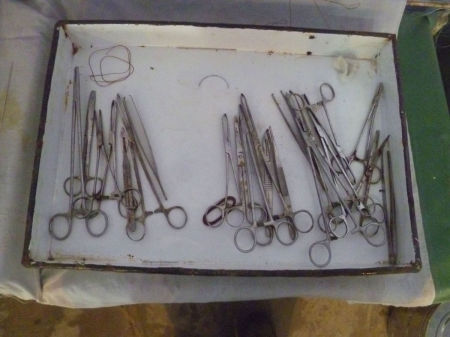Four health officials from a state-run facility in India’s Chhattisgarh state have been suspended after it emerged contaminated instruments were used while performing sterilisations on 83 women.

The women, who were attending a mass sterilization camp organized by the Chhattisgarh state government in Bilaspur, all underwent their procedures in a six hour period on Saturday (November 8). Around 75 of the women complained of pains or other complications within 24 hours of being discharged and were admitted to different hospitals over the weekend. By Monday, nine of the women, all of whom were under 32 years old, had died from what preliminary examinations is septic shock. Ten more women are critically ill.
The doctor who performed the operations is accused of breaching guidelines that limit surgeons from performing more than 30 sterilizations a day, according to an official, who asked not to be named because details of the investigation are private. He also failed to disinfect the instruments before using them again, the official said.
“It’s a case of negligence,” Raman Singh, the state’s chief minister, told reporters at a news conference today (Tuesday), adding that the doctor, R.K. Gupta, had been suspended and a criminal investigation is under way. “It is unfortunate that such an incident occurred in a scheme of national importance.”
“This is an exceptional case which unfortunately happens once every four or five years,” said Abhijeet Phatak, medical program specialist with International Planned Parenthood in New Delhi. “The fault lies with the person who did not disinfect the equipment on a day when 80 or 90 women are being sterilized. But also the strategy of having one-day camps for sterilization is to blame and should be reconsidered.”
The annual sterilization camps are held between October and February as part of a larger programme to control India’s billion-plus population. Women who go through the surgery are given Rs 1,400 (about £14) by the state. Health workers get Rs 200 (£2) for bringing a woman to the camp.
India in 1952 was the first country to start a family planning program. Emergency rule in the 1970s allowed then-prime minister Indira Gandhi to forcibly sterilize people, according to the US-based Population Research Institute.
Between June 25, 1975, and March 1977, about 11 million men and women were sterilized and 1 million women were inserted with intra-uterine devices, the group said in a report, citing Marika Vicziany’s book “Coercion in a Soft State: The Family-Planning Program of India.”
India currently has the world’s third-highest female sterilization rate after the Dominican Republic and Puerto Rico among more than 180 countries tracked by the United Nations.










